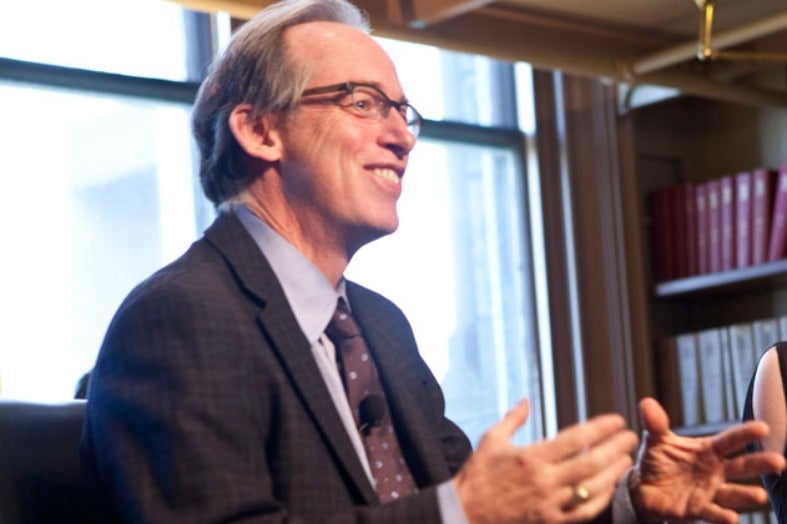Title: Blog on Catholic, Jesuit Tradition, Literature, and the Arts Debuts
Award-winning author Paul Elie, who is also a senior fellow at the Berkley Center for Religion, Peace and World Affairs at Georgetown, has created a new blog, “Everything That Rises,” designed to foster conversations about the university, Jesuit heritage, Catholic tradition, literature, the arts and public affairs.

Award-winning author Paul Elie has created a new blog for the university designed to foster a conversation about Georgetown, Jesuit heritage, Catholic tradition, literature, the arts and public affairs.
President John J. DeGioia asked Elie, now a senior fellow at the university’s Berkley Center for Religion, Peace, and World Affairs, to write the blog, called “Everything That Rises.”
The blog touches on everything from Pope Francis to the expression of religious belief in literature, carrying forth a conversation following on an essay of his that was published on the cover of the New York Times Book Review.
A Sunday feature called “Our Kind of Spirituals” presents YouTube videos of songs that are “overtly or stealthily spiritual,” Elie explains, by artists ranging from Mavis Staples to REM to Johann Sebastian Bach.
“Through the content that Paul Elie shares on this site, he reflects the types of conversations that take place here at Georgetown every day,” DeGioia says.“These are conversations that seek a deeper understanding of the world around us – from current events, to literature and the arts – and also find great joy in doing so.”
Twin Pillars
The title of the blog mirrors an expression coined by renowned Jesuit paleontologist Teilhard de Chardin, S.J., (1881-1955) to suggest the ways the theory of evolution and Catholic understanding of divine providence might be reconciled. He proposed that human life and earth evolve upward into a more complex form in line with a universe directed by God.
Flannery O’Connor (1925-1964) used the expression as the title of a 1963 short story about racial integration in the South.
“Those are our twin pillars,” Elie says, “Teilhard and Flannery O’Connor. They suggest literature and the arts, America in the 20th century, Catholic heritage and Jesuit heritage. That’s the spirit of the site, and our hope is that I can bring all this together, so that it all converge in a way that represents the university and has a feel of an ongoing conversation.”
Elie, a former senior editor at Farrar, Straus and Giroux and an instructor in Columbia’s MFA writing program, is author of The Life You Save May Be Your Own: An American Pilgrimage, a group portrait of the American Catholic writers O’Connor, Thomas Merton, Dorothy Day and Walker Percy.
Also the author of Reinventing Bach, he writes on religion and other subjects for The New York Times, The Atlantic, Commonweal and other publications.
Religious Lives
Since 2008, Elie has led the Berkley Center’s Faith & Culture series, which invites writers to talk about their work in the context of religion and culture.
In February 2012, the upstate New York native joined the center as a senior fellow and began leading a partnership known as the American Pilgrimage Project with the documentary organization StoryCorps.
“Everything That Rises will be a natural place for American Pilgrimage Project material,” Elie explains. “Our aim is to gather several hundred stories of crucial moments in Americans’ religious lives, and this is a place we can put them into circulation.”
Teacher, Scholar
The American Pilgrimage Project is designed to gather, record and share ordinary Americans’ stories on the role of religious belief in their lives.
On Wednesday afternoons next fall the senior fellow is at the Berkley Center will teach a course called A Realism of Distances: World Literature With a Religious Dimension, in which students consider the complex and various roles religion plays in contemporary societies through literature.
The course explores novels such as Brideshead Revisited by Evelyn Waugh, Barbara Kingsolver’s The Poisonwood Bible, and Orhan Pamuk’s My Name Is Red.
Reflections on the Pope
Elie’s blog, for which he posts an essay-like short piece or two each day, has a wide-ranging focus.
One early entry about Pope Francis, for example, focused on the pontiff’s candid interview with progressive daily newspaper La Repubblica editor Eugenio Scalfari, in which the pope twice asked Scalfari, “What do you think?” and said “You’re probably right.”
“Truly,” Elie wrote, “has any of these expressions ever issued from the lips of a pope in the 2,000-year history of the See of Peter?” He added that the pope’s remarks “advance by giant leaps the conversation that Francis – long past time – has finally gotten going.”
Electric Moment
The writer, who lives in Brooklyn with his wife and their three children, also makes note of Georgetown-specific events, such as the opening of the new Calcagnini Contemplative Center in the Blue Ridge mountains, its Designing the Future(s) of the University conversation series, and next week’s major conference on Faith, Culture and the Common Good.
Elie will lead a panel discussion on literature during the conference and introduce an acclaimed production of Flannery O’Connor’s short story “Everything That Rises Must Converge” – the inspiration for the new blog’s title.
“To hold this kind of public in the heart of Washington, with Georgetown as the oldest Jesuit university at a time when we have the first Jesuit pope – it’s electric,” Elie said. “There really is so much going on at Georgetown of interest that I can populate the site with items having to do with the university effortlessly. They fit right into the conversation.”